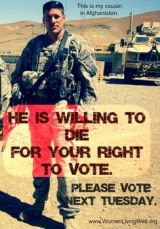 November
04
November
04
Tags
Defending the conscious abstention
As a citizen of the 7th District of New Jersey this midterm cycle, I have the right to cast a vote and participate in our representative democracy.
Or not.
My conscious abstention this midterm election came as a result of my decision that I was not represented by any of my ballot-options. Abstention is a legitimate democratic act that even our Congress and Senate offer as an option in their voting process.
If abstention is legitimate for politicians, why is it seen as an illegitimate act of political laziness when conducted by a citizen? Election cycles bring about what I call “Super Bowl politics”; a pattern akin to non-NFL watching individuals miraculously becoming heavily invested in one football game per year, only to ignore the sport until the following February.
The same goes for elections.
The United States electoral process provides individuals with an inflated sense of political participation for casting a more-or-less irrelevant vote. As Mark Bray says in his Translating Anarchy:
“…although we as Americans are taught from a very early age that voting is the pinnacle of citizenship and political action, anarchists, and most OWS (Occupy Wall-Street) organizers, agree that the simple five-minute act of pulling a lever or filling in a bubble for high political offices is perhaps the least important political act you can take.”
Mark Bray hits the nail square on the head: there are 365 days to be political every year, and somehow choosing to not participate in one day’s rituals is stigmatized as a betrayal of soldiers who died in war.
The protests against police violence and militarism in Ferguson, Missouri are only one example of popular acts of political consciousness superior to the casting of an annual vote on a Tuesday in November. At minimum, sustaining a political demonstration around a specific cause requires the community’s formulation of collective grievance and organization. The political communication among community members in a situation such as Ferguson increases the political consciousness of those individuals, who will likely take their own personal political involvement beyond the current demonstrations happening in their community.
Yet, popular protests are devalued and portrayed as “overreactions” in mainstream political culture. The more appropriate action, we are told, would be for Ferguson residents to calmly take their grievances to the polls and wait for a Democrat or Republican to solve their problems, because filibusters and gerrymandering are obviously more democratic than communities protesting state violence.
Teaching the American public that participation in every election is the key to political consciousness is detrimental to the goal of fostering a politically and socially conscious society. In this system, an individual’s search for the difference between the inevitable Democratic or Republican option (a difference that too often doesn’t exist) is celebrated as the confirmation of one’s entrance into American political culture. Instead of producing a politically conscious citizenry whose blood flows by the pulse of midterm Senate races, we create apathetic citizens unaware that real politics doesn’t happen behind neatly curtained-booths, but in the streets.
Recent Comments